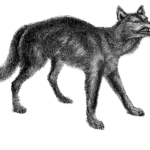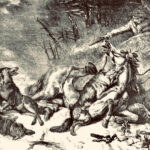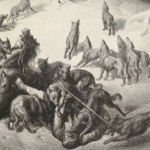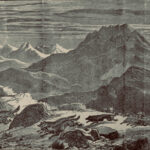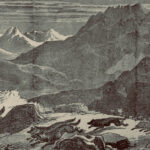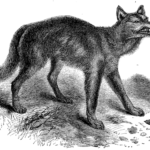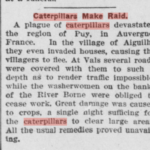On the road to [Mont-Dore], a troop of hungry wolves attacked three carriage-drivers, one of whom was torn to pieces; the other two escaped. The wolves devoured the horses belonging to the carriage.
-from the Literary Gazette and Journal of Belles Lettres, Arts, Sciences, Volume 4, January 1820
Daily life in old Auvergne was a serious business. Auvergnats had to endure a range of trials and tribulations: months-long droughts, crop-destroying hail, Siberia-like snow, and — according to some reports — even home invasions by very hungry hordes of caterpillars. Yet there was only one thing that really made the average townsperson’s hair stand on end: the wolf.
Up until the late nineteenth century, wolves were a real menace in Auvergne. In 1885, English writer J. Chesney said that they would regularly break through roofs, “kill cows and sheep, and even snatch up a dog at his master’s door.” Auvergne’s remote forests and mountains were also home to man-eating wolves, the most famous of which was the notorious Beast of Gévaudan.

Reports of wolf attacks also inspired a number of thrilling tales and short stories, such as “A Sporting Adventure in Auvergne” (1833) by the English author George Agar Hansard. In the tale, Hansard describes his face-off with a she-wolf in the mountains of Mont-Dore. Hansard is ultimately rescued by a garde-chasse, a forest ranger employed by a local nobleman: “Monsieur Le Baron de St. Geneste.” Stuck in the midst of a heavy rainstorm, the two retreat to a nearby cave, start a fire, and sit to a “woodman’s fare” of venison. The ranger then proceeds to tell Hansard of his own terrifying childhood experience with wolves. This long-forgotten story within a story is reprinted below:
“There few persons yet living who can recollect so far back as 1768 or the dreadful winter which has rendered that year remarkable in the annals of Auvergne. The weather which had been fine and clear though remarkably cold up to the latter end of November changed suddenly and in the night of the twenty fourth a terrible snow storm commenced and continued for four days with but trifling intermission.
“On the evening of the 29th a strong wind arose. The roads became impassable from the tremendous drift and all intercourse between the towns and villages was broken off. The inhabitants kept as much as possible within their houses for even in the broad day a stray wolf was occasionally seen prowling around the farmyards while at night they scoured the country in packs and rendered furious by hunger attacked every living thing that was unfortunately left unprotected. Their savage howlings as they besieged the folds and other outbuildings where the cattle were lodged were distinctly heard in the awful silence of the night filling every heart with anxiety and preventing the possibility of sleep.
“One night, when kept awake by these alarming visitors, I heard the sound of a horse’s feet approaching the village at a furious pace, and at intervals the piercing cries of a human being for assistance. I was alone at a distance from the rest of the family. My mother slept on the ground floor, and my father was absent at the chateau St. Geneste, to assist in the morning at the unharbouring of a stag. I lay for some moments trembling with fear, but, as the sounds came nearer, curiosity overcame my terrors. I arose, and, shivering with cold, crept towards the casement, which I opened. The sky was overspangled with stars, and the moon shone brightly upon the cold, spotless snow. Opposite to our cottage door, and about twenty paces distant from the road-side, stood the village inn. As I intently gazed in the direction from which the sounds had proceeded, a horseman gallopped furiously towards the auberge, the sign of which had probably attracted his attention, as it swung backward and forward in the wind.

“Suddenly checking his horse before the door, he shouted in the most heart-rending manner for admission and assistance. No answer was returned indicated that his appeal was heard all appeared sunk in sleep, or, what is more probable , too much alarmed for their own safety to arise. Just at this instant there arose from behind a fierce and hateful yell, as if a hundred demons had broken loose from those regions of torture in which they are said to be confined. The horse reared and plunged violently; and his unhappy rider, with a cry of despair, which still seems to ring within my ears, again spurred swiftly onward. As I just observed, monsieur, I was but a boy, scarcely eleven years of age; and my heart died within me, as, leaning forth my body from the window, I plainly distinguished the whole pack turning the corner of the church, and advancing in full cry towards the spot above which I stood.
“For a moment they appeared to have lost the scent, or were arrested by the hopes of a second victim; for, while some, with noiseless step and noses to the earth, hurried to and fro before the inn door, the greater number collected under my window, and, rearing upon their hind legs, snuffed the air and barked and howled at the prey beyond their reach. At length the scent was recovered, and the whole pack, with a fatal precision, again set forward in the direction taken by the unfortunate stranger. I remained listening till the sounds were lost in the distance, and then crept trembling to bed, but not to sleep.
“On the following morning, the utmost consternation prevailed among the villagers, for the cries of the stranger had been heard by many besides myself. They assembled in groups before the door of the auberge, or strolled up and down the road in small parties, in earnest and serious conversation. My mother, to whom I related what had occurred, now joined the crowd, leading me by the hand; and I soon became the sole object of their attention, as they listened in breathless silence to my circumstantial narrative of the horrors of the night. When I arrived at that portion of my story, in which I spoke of the unfortunate man’s wild and despairing solicitations for admission and succour, and pointed at the same time to the prints of the horse’s hoofs, and the foot-marks of his pursuers, still visible upon the snow, a mingled cry of horror and pity burst from the listeners.

“While all were silently examining these painful confirmations of my melancholy story, my father, armed with his rifle, and surrounded by his dogs, as was usual when on duty, entered the village, his face was pale as death; in his hand he carried a pistol, the remnants of a horseman’s cloak, and a saddle much torn and smeared with blood. In crossing the heath, which leads from the chateau to the high-road, the dogs suddenly started off and plunged into a hollow, which lies about a gun-shot from the path he was pursuing.
“Urged by curiosity, my father approached the place, and, with horror and astonishment, beheld the mangled and recent skeleton of a horse, to which the saddle still remained attached, the portion of a cloak just alluded to , and a discharged pistol lying upon the earth. No doubt now existed of the stranger’s fate. A few papers and some other articles of dress were afterwards discovered scattered among the brambles; but no clue existed for discovering who he might have been or whence he came; nor were any enquiries respecting him ever made in the neighbourhood.”
Want to read more short stories about Auvergne? Click “History and Literature” below.




